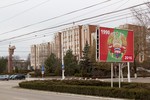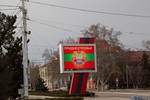After a new president came to power, what happened to Transnistria’s media?
I have analysed Transnistrian online media 18 months after Vadim Krasnoselski came to power. I found clear evidence of selective removal of “unpleasant” old news items, but no evidence of mass dismissal of journalists.
In Transnistria – a de facto independent state located within the internationally recognised borders of Moldova – in the aftermath of the December 2016 presidential vote, the risk of increased tensions seemed to be particularly high, as Vadim Krasnoselski – who won the vote – had threatened to jail the incumbent Shevchuk on live TV during a pre-electoral debate, and people in top positions close to Shevchuk knew they had a lot to lose from an unfavourable electoral outcome.
The presidential election in Transnistria
Originally published on Presidential Power
The presidential election that took place on 11 December 2016 in Transnistria, a de facto independent state within the internationally recognised borders of Moldova, ended with the resounding victory of the speaker of parliament, Vadim Krasnoselski (62,3%), over the incumbent president, Yevgeny Shevchuk (27,38%), the candidate of the Communist party, Oleg Khorzhan (3,17%), and others (including 3,4% who voted “against all”, which is formally one of the options given on the ballot).
The upcoming presidential election in Transnistria
Originally published on Presidential Power
Presidential elections in Transnistria, a de facto independent state within the internationally recognised borders of Moldova, are scheduled for 11 December 2016. Out of a total of seven registered candidates, the two main contenders for the position are the incumbent president, Yevgeny Shevchuk, and Vadim Krasnoselski, who currently serves as the speaker of the Transnistrian parliament (locally still known as “Supreme Soviet”).
Freedom House ranks Transnistria as “not free”, yet elections take place regularly, are competitive and – as the 2011 vote showed – a serving president can lose at the polls.


